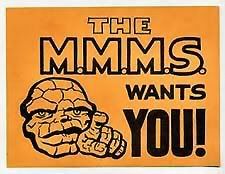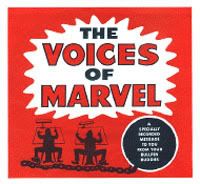The Merry Marvel Marching Society

Last night on Heroes, after the police detained Hiro, they noted that he didn't have much in his wallet besides an honorary membership to the Merry Marvel Marching Society. Most of the audience missed the joke, of course, but there's no reason they should have caught. So what the heck was the MMMS? It was a company fan club founded in the early days of Marvel Comics, born out of Stan Lee's impish and irresistible used car salesman hucksterism and love of alliteration. You signed up for a dollar - an incredible sum in those days which could buy you a small pile of comics - and got a bunch of precious, precious swag: a membership card, a button, etc. The most bizarre part of the haul was a 33 1/3 rpm record featuring the voices of the legendary Marvel Bullpen: Stan Lee and Jack Kirby, Flo Steinberg, Sol Brodsky, Artie Simek, Sam Rosen, Chic Stone, Wally Wood, Dick Ayers, Don Heck, Stan Goldberg, and a silent Steve Ditko. You can hear an mp3 of the record here. (Link via Heidi MacDonald)
Stan Lee, an aspiring author who served in the Army in WWII under the designation of "playwright", choreographed the vaudeville skit with Herculean intensity, as recounted by Jack Kirby in an interview with Mark Evanier:
Evanier: That record seems so weird. Was it recorded in the office like it sounds?

Kirby: No, it was in a recording studio. We rehearsed in the office. Stan treated it like he was producing the Academy Awards. He had this script he'd written. He'd written it and rewritten it and rewritten it and as we were recording it, he kept rewriting it. We all went into the office, more people than there was room for. When you weren't rehearsing your part, you had to go out in the hall and wait. No work was done that day on comics. It was all about the record. We rehearsed all morning. We were supposed to go to lunch and then over to the recording studio, which was over on 55th Street or 56th. I forget where it was. But when lunchtime came, Stan said, "No, no, we're not ready," so most of us skipped lunch and stayed there to rehearse more. Then we took cabs over to the recording studio and we were supposed to be in and out in an hour or two but we were there well into the evening. I don't know how many takes we did.
Evanier: On the record, Steve Ditko isn't heard. They say he slipped out the window. I assume he just refused to be part of it.
Kirby: Steve was much smarter than we were about those things.
Evanier: Have you listened to the record lately?
Kirby: No, and if you try and play it for me, you'll be out the window with Ditko.
 Sure, this is an intense exercise in nostalgia and it's great to hear the voices of the legendary bullpen and imagine this sort of humorous camaraderie was what actually happened there on a daily basis. As Heidi MacDonald points out, what's striking is that this record, with its thick New Yawk accents and, was put together by "working class folks, working in a dingy midtown office" staffed by "cranky editors and tightfisted businessmen", a sharp contrast to fandom's image of them as "myths carved in granite". What also struck me was how well this record actually worked, and it's often genuinely funny. It's easy to make fun of Stan's blatant hucksterism - and hell, we should make fun of it - but we should also realize how good he was at it and how successful it was. Of course, this isn't anything near what's most important about what Stan and Jack created, but without Stan's silly nicknames and fostering of fandom and cries of "Excelsior!", MC wouldn't have been nearly as successful as it was.
Sure, this is an intense exercise in nostalgia and it's great to hear the voices of the legendary bullpen and imagine this sort of humorous camaraderie was what actually happened there on a daily basis. As Heidi MacDonald points out, what's striking is that this record, with its thick New Yawk accents and, was put together by "working class folks, working in a dingy midtown office" staffed by "cranky editors and tightfisted businessmen", a sharp contrast to fandom's image of them as "myths carved in granite". What also struck me was how well this record actually worked, and it's often genuinely funny. It's easy to make fun of Stan's blatant hucksterism - and hell, we should make fun of it - but we should also realize how good he was at it and how successful it was. Of course, this isn't anything near what's most important about what Stan and Jack created, but without Stan's silly nicknames and fostering of fandom and cries of "Excelsior!", MC wouldn't have been nearly as successful as it was.
